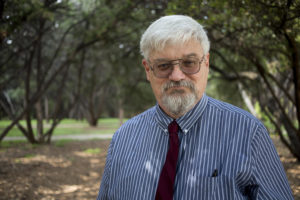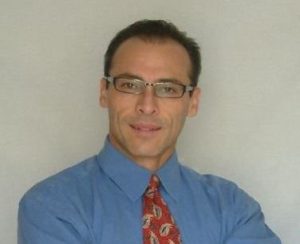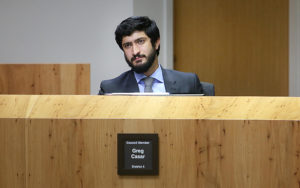More than a yard sign: A near repeat of 2014 in District 4 race
Tuesday, September 13, 2016 by
Audrey McGlinchy, KUT Austin’s District 4 is one of its most diverse – more than 65 percent of its residents are Hispanic, and nearly 10 percent of the district is African-American.
Currently, City Council Member Greg Casar represents the north central district. Austin’s youngest-ever Council member, Casar faces two opponents this election – one he beat in 2014 and a newcomer. The newcomer, Gonzalo Camacho, holds some controversial views – such as support for removing fluoride from drinking water – that bear striking similarities to those of Laura Pressley, one of Casar’s opponents from 2014. Some faces may be different, but it’s a similar race to the one held in 2014.
To better inform voters, we thought we would focus on three of the big issues of the last year-and-a-half of Austin’s first 10-1 Council. We asked non-incumbents how they would have voted on these major issues. Then we added one more category: We asked incumbents to name a pet project and non-incumbents to tell us what they’d like to focus on.
It’s all part of a series KUT is calling “More Than a Yard Sign.” (The first installment, which focuses on District 2, is available here.)
Louis C. Herrin III

Louis C. Herrin III works as an environmental engineer for the state. He ran for District 4 representative last year but garnered less than 3 percent of the vote.

Herrin said he could have supported the transportation bond if it, as some Council members proposed, had been split up among different initiatives. “Let the citizens tell (us) what things they want to do,” he said. Instead, it will go to voters as one package.

“I’m a person who believes in fair market and everybody having the same set of rules,” said Herrin. He said he also supports making cab and ride-hailing companies subject to the same market restrictions.

Herrin pointed out that the majority of District 4 residents are renters (only about a third of the district’s residents own the home they live in), but he said he would support anything to lower property taxes.

“We need to streamline that (boards and commissions) process,” said Herrin. He also would like to see more citizen access to Council, including allowing public testimony to take place outside of City Hall (there’s a pilot program for that) and setting time limits on public hearings.
Gonzalo Camacho

Camacho is a transit engineer who runs his own firm. A native of Bolivia, he ran twice for City Council in Houston, losing both the 2003 and 2009 races.

Camacho said he is concerned about what the bond would cost taxpayers. (Estimates from the city say the average homeowner would see roughly a $60 increase in property taxes per year.) “There’s no doubt we need improvements,” Camacho said. “The question is how are we going to make improvements and how best to fund the process.”

“As a traffic engineer, I advocate for all modes of transportation,” said Camacho. “Also, I advocate for a free market economy.”

Camacho said he does not understand why City Council has not pushed harder for a 20 percent homestead exemption. (This year, Council members passed an 8 percent exemption, up from 6 percent the year before.) “It’s critical for people to be able to afford their homes,” said Camacho.

“The whole middle class is going to be driven out of Austin,” said Camacho, who did not elaborate on what he might propose to ease the cost of living in Austin. “There’s no money that’s going to stop that until we start rethinking the process.”
Greg Casar

Incumbent Greg Casar directed policy at the Workers Defense Project before becoming Austin’s youngest Council member at the age of 25.

Although the bond has its flaws, said Casar, he supported it because it would make necessary improvements to major roads and is likely to receive the votes needed on Election Day. “The challenge with bonds in general for me has been that we have to get people to ultimately vote for them and support them,” he said before casting a final vote in support.

“I am not sure that mandatory fingerprint background checks for drivers will effectively reduce the alarming number of sexual assaults by ridesharing drivers that have been reported to us,” Casar wrote back in April. While he supported the laws passed by Council, he said he had mixed feelings – and wished ride-hailing companies Uber and Lyft had chosen to stay in Austin.

Casar voted against raising the city’s homestead exemption by 2 percent, saying that he felt the money would be better used for community services, including city-subsidized after-school programs.

Casar led the creation of a fair-chance hiring measure, which mandates delaying a criminal background check for potential hires until a preliminary job offer has been made. “When I was first running for Council just under two years ago, I had a former elected official tell me that the city and local government wasn’t really a social justice thing, and I couldn’t disagree more,” he said.
This story was produced as part of the Austin Monitor’s reporting partnership with KUT.
The Monitor’s work is made possible by donations from the community. Though our reporting covers donors from time to time, we are careful to keep business and editorial efforts separate while maintaining transparency. A complete list of donors is available here, and our code of ethics is explained here.
You're a community leader
And we’re honored you look to us for serious, in-depth news. You know a strong community needs local and dedicated watchdog reporting. We’re here for you and that won’t change. Now will you take the powerful next step and support our nonprofit news organization?























